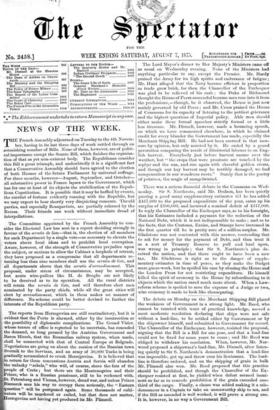The Lord Mayor's dinner to Her Majesty's Ministers came off
as usual on Wednesday evening. None of the Ministers had anything particular to say, except the Premier. Mr. Hardy praised the Army for its high spirits and endurance of fatigue ; Mr. Hunt alleged that the Navy became efficient in proportion as trade grew brisk, for then the Chancellor of the Exchequer was glad to be relieved of his cash ; the Duke of Richmond thought the House of Peers successful because men rose into it from the professions,—though, be it observed, the House is just now mainly governed by old Peers ; and Mr. Cross praised the House of Commons for its capacity of listening to the pettiest grievance and the highest questions of Imperial policy. Able men should either make these formal speeches strictly formal or a little less tiresome. Mr. Disraeli, however, made a bouncing speech, on which we have commented elsewhere, in which he claimed credit for every blunder the Government has made, especially the Merchant Shipping Bill. He had not been coerced in that mea- sure by opinion, but only assisted by it. Ile ended by a grand peroration comparing the result of Ministerial labours to an Eng- lish harvest. Everybody just before harvest moans over the weather, but "the crops that were prostrate are touched by the zephyr and the sun, and rise again with cheerful golden crests, and though our hay harvest may be terribly damaged, we find compensation in our wondrous roots." Surely that is the poetry of potatoes, the magic of mangelwurzel.






























